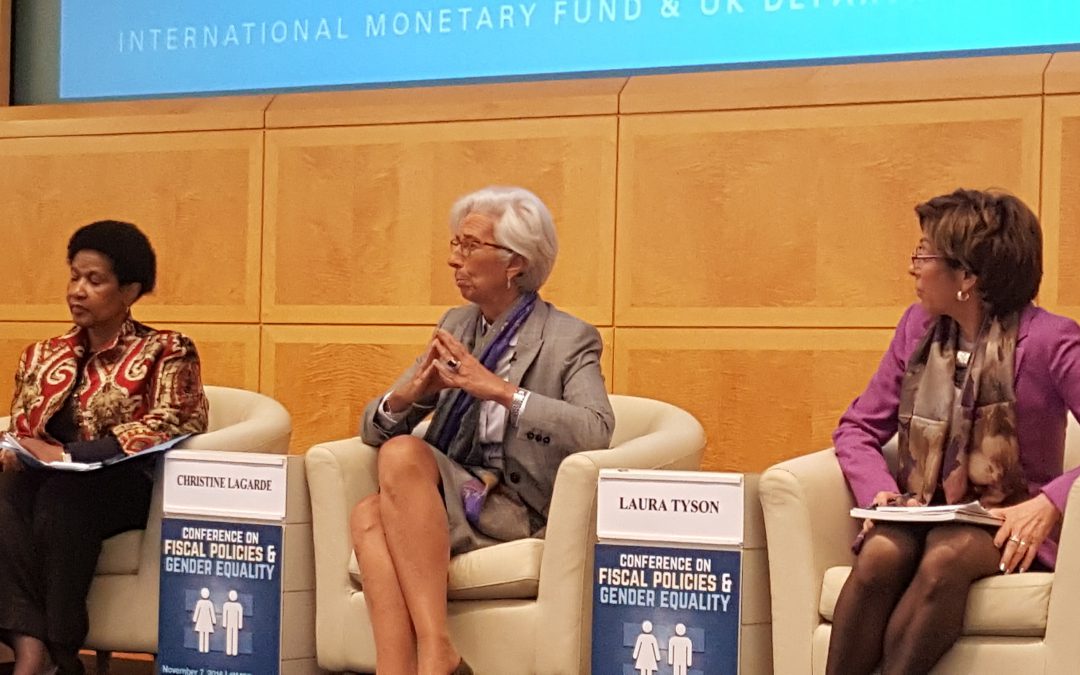WASHINGTON — International Monetary Fund Managing Director Christine Lagarde said fiscal policies worldwide work against women, especially in developing countries, but also endorsed reducing the U.S. wage gap throught mandatory paid parental leave and child care – two key elements of Hillary Clinton’s platform.
Leading a panel at the IMF’s fiscal policies and gender equality conference, Lagarde said “gender budgeting” – fiscal policies that take women’s needs into account – is critical to ending global poverty, reducing overall inequality and jumpstarting low growth rates in the West.
“”For anyone who doesn’t think it’s a moral imperative, it’s an economic no-brainer to reduce gender inequality,” Lagarde said.
Before the panel began, pictures of Lagarde and other world leaders tweeting or saying the slogan “poverty is sexist” flashed above the stage. Lagarde, the first female director of the IMF, helped coin the phrase in 2015. It’s meant to encapsulate the wealth of data suggesting poverty and economic policies disproportionately hurts women and the idea that investing in women and women’s education is the fastest and most effective way to curb global poverty.
Most of the panel focused on stemming inequality in the developing world, a task the panelists said requires far different measures than reducing the pay gap in the United States and other first-world nations.
Lagarde said that developing countries need to tailor their investments to the needs of women. For instance, some countries have invested heavily in public resources such as transportation, but not transportation to help women who need to get water from rivers to their home or take crops to market, she said.
“It’s not enough to just say we need better transportation,” Lagarde said. “[The policy] needs to take into account imperatives for women such as security and the tasks and duties [women] accomplish.”
However, in developed countries like the United States, Lagarde said tax structures are a big part of the problem. She said first-world governments should promote tax measures that help single-parent families, which are generally low-income and headed by women.
Democratic Nominee Hillary Clinton has promised tax credits for middle class families and those taking care of the elderly and sick, a burden that generally falls on women. Conversely Republican nominee Donald Trump’s tax plan, which simplifies the tax code into three distinct brackets, would increase taxes for single-parent families, according to the nonpartisan Tax Policy Center.
In response to a question, Lagarde endorsed two ideas: publicly funded child care and paid parental leave that give both men and women the flexibility to either work or stay at home. Both are part of Clinton’s plan to reduce the gender wage gap.
Romina Boccia, a labor policy expert at the conservative Heritage Institute,said in an interview that paid leave could only work if it was gender neutral because mandated maternity leave encourages employers to discriminate against women of childbearing age. Boccia disagreed with the premise that the U.S. needs to focus on helping women in their careers, noting that young women now earn more bachelor’s, master’s and doctoral degrees than men and earn more than young men in urban centers.
“Women are definitely on the rise as an economic force,” Boccia said. “So I don’t think we have a problem with female labor force participation.”
However, the panelists said the policies Lagarde outlines are vital to encouraging women to enter the workforce.
“It’s not enough to push individual women to enter this economic model, when that model is fundamentally broken and not working for women,” said Julie Delahanty, the executive director of Oxfam Canada, a nonprofit that works to end poverty around the world.


